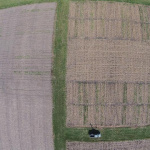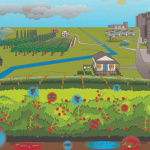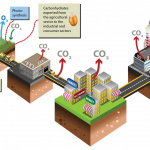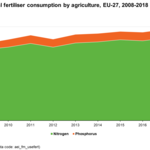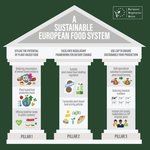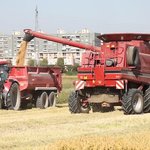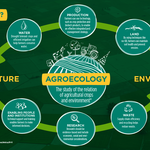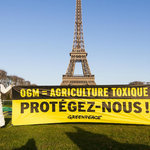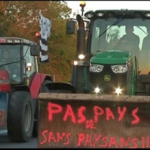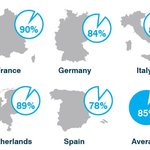Farmers from Europe to South America have one large, fragile asset more important than all others. Their land. Specifically, a thin layer of topsoil that can readily wash away or be depleted. To prevent that, many farmers grow inedible plants during the off-season.They help prevent erosion and absorb excess nutrients like nitrogen.
These cover crops have become so common it can be difficult to know which to choose from when it comes to complex crop rotations. A recent experiment in the U.S. state of Illinois planted different cover crops between the common rotation of corn and soybeans.…
Agriculture
France Stratégie: Agroecology Is More Profitable - And They Have A Plan To Get Every Farmer Doing It
A recent analysis of economic data finds that organic farms are more profitable than conventional farms even though their costs for pesticides and labor are higher. The reason is primarily because buyers are willing to pay more.
They note that in 2016 the gross operating surplus of conventional beef farms was 6000 percent of conventional (3 euros per hectare for conventional versus 180 euros for organic) while the the direct profit margin of organic farming averaged 103 percent more. If a farmer switches, the France Stratégie computer estimate says, they would get a direct margin gain of…
With US-EU agriculture trade talks already stalled, the EU’s new "Farm to Fork” strategy escalates the science war and perhaps even isolates the EU even more - because EU wants to bully other countries into adoption of EU-style regulation.
If there is one thing COVID-19 has taught us, it's that food regulations just get in the way. Individuals couldn't buy what they wanted, rationing occurred, but the reason was not supply. Businesses were not allowed by regulation to sell bulk foods they had purchased to consumers. And companies were not allowed to sell food meant to be sold in bulk to…
A UN Intergovernmental Panel on Climate Change (IPCC) claimed that agriculture is one of the main sources of greenhouse gases - a climate villain.
But their finding was not based on science, it was based on simplistic parameters, a closed system which any field of science would disregard as intentional framing. Yet activists opposed to agriculture and the fields of science that support it jumped on it as settled science, where instead there was no consensus at all.
The fundamental process in agriculture is photosynthesis, in which carbon dioxide is captured by crops and at the same time…
On World Bee Day, May 20th,the European Green Deal was released and few are happy with its final committee iteration but most unhappy will be conventional farmers.
The European Commission's Farm to Fork and Biodiversity strategies endorses the organic industry and calls for their share of the market to increase to 25 percent while other vested interests criticize that it does not do enough to reduce use of meat. Farmers are worried about lack of guidance around a call to reduce pesticide usage by 50 percent when BASF is so concerned about Europe's undermining of science they have begun…
European organic industry activists have been hoping their March Against Bayer & Syngenta "virtual" events would gain traction but the only people talking about it on social media are paid allies and Russian propaganda sites such as Russia Today and Sputnik. So they are pivoting to the less educated population in Brazil, whom they hope can be exploited with more success, so they are targeting European agriculture companies that way. Campanha Permanente Contra os Agrotóxicos e Pela Vida has been using identical "highly hazardous pesticides" advocacy messaging in efforts to worry indigenous…
Australia has completed its move toward modern approaches to agriculture. South Australian has lifted its ban on modern genetic engineering (older mutagenesis engineered foods were still allowed) and councils can continue to adhere to the organic industry manufacturing process but it will no longer be illegal to use modern approaches to farming there.
Primary Industries Minister Tim Whetstone announced the change and noted the Government made multiple attempts to lift the ban without engaging in the kind of mandate South Australia was using against farmers. He said they had compromised in…
In modern politics, populism has become a bad word but democracy itself is populist, and in recent decades populism has become a battle cry for alternative food supply movements.
There are some who contend that representative agriculture by a tiny percentage of the population - a republic of food - needs to be supplanted by short food supply chains which deal directly with consumers - populism. The term they use is not populism, of course, they re-branded it as "food sovereignty" and "local determination of good agricultural practices" and a desire to remove "industrial" agriculture, but such…
While some will lay the spread of coronavirus at the feet of the World Health Organisation (for protecting China from criticism in its refusal to accept that they had a deadly virus) others will try to claim it was caused by 5G cellular service or vaccines. Almost all Europeans will be skeptical of those claims. What about blaming agriculture? On that topic, many Europeans do believe it is a problem, and some are willing to consider that it led to more COVID-19.
When the crisis is over, instead of being more suspicious of environmental NGOs that have spread misinformation about SARS-CoV-2,…
While the coronavirus pandemic dominates global news, another deadly on-going public health emergency has gotten lost in the headlines. Tens of millions of Africans risk starvation as a continuing Desert Locust infestation explodes across the Horn of Africa. For more than six months, the UN’s Food and Agricultural Organization (FAO) has sounded the alarm. But the response of FAO’s leadership, otherwise preoccupied with imposing zero-technology, low-yield “agroecology” on African farmers, has been conflicted and flat-footed at best.
FAO is one of the leading international organizations…
U.S. Secretary of Agriculture Sonny Perdue is a pro-science agriculture advocate, arguing it's the best way to address climate change and sustainability without impacting poor people and those in developing nations.
What is less clear is how willing the European Union is to negotiate its 2001 biotechnology regulations at a time when courts are using those to argue that food strains created using mutagenesis, including those already considered part of the organic process, must be labeled as Genetically Modified Organisms - GMOs.
The activist group GMWatch is worried that if government chooses…
France - On February 7, 2020 The Council of State rendered a decision to reconcile French law with European directive 2001/18 of March 12, 2001 relating to the deliberate release of genetically modified organisms (GMOs) in the environment. 'Deliberate release' is an important distinction, as we shall see.
In October of 2016, the Confédération paysanne and eight associations asked preliminary questions at the Court of Justice of the European Union (CJEU) about other forms of genetic engineering. The questions, according to the interpretation of the request made by the Council of State “[c]…
Mutagenesis is a process where new strains of food and products are created using chemicals and radiation in the lab. It is much faster than the natural mutation process while being more targeted than old techniques like hybrids and grafts. In the 1970s, its successor, transgene science and genetically modified organisms (GMOs), began to be studied and by the early 1980s products began to appear. In the 1990s, the American state of Hawaiʻi approved a papaya that had been devastated by a natural virus after breeding techniques and chemicals failed to stop it. Other foods followed.
When…
On December 11th the European Commission releases its European Green Deal plan, with a vow to reduce pesticide usage by 50 percent. While that is fine for politicians, farmers are asking where the reductions can occur.
They are concerned that the Green Deal lists no "credible alternatives" to pesticides and how politicians will create "a complete overhaul" without them.
There also remains confusion about the only alternative to pesticides that might help - biotechnology. Though the science community recognizes the value of biotechnology, as does the European Court of Justice, the official…
Rice straw and waste from pruning citric fruit trees are typically burned as waste but a new paper says those could feed ruminant animals.
A team of researchers designed new diets for cows, sheep, goats, etc. from these agricultural sub-products which would help decrease burning.
Obviously it is not just rice straw and citrus leaves, but they were able to revalue those sub-products by mixing them in with other ingredients that ensure that all the nutritional needs of the animal are met.
“The Low Carbon Feed diets have added rice straw and leaves from orange and lemon trees to the compound…
Merchants of doubt in the environmental sector endlessly accuse the agricultural world of being among the key ills the world faces, and politicians latch on to such populist rhetoric in municipal elections.
Several municipalities have even issued anti-pesticide buffers in agricultural areas citing the precautionary principle.
Now, French farmers are fighting back, noting that agriculture is more friendly to the environment than ever and that concern should instead be directed toward cities and towns that continue to expand and create more pollution, while deflecting blame onto farming.…
In France, The Departmental Department of Population Protection routinely visits markets, restaurants and supermarkets of the Côte d'Azur to conduct "surprise" checks. They also visit organic farmers to check the organic certificates of sellers.
A recent analysis finds something surprising; 30 percent of food sold as organic is fraudulent but without government checking no customers would ever know the difference.
Organic farming is booming in the Alpes-Maritimes. They list 234 organic farms and 3,976 hectares of organic land and the requirements should be simple. They can:
Use any…
Vandals who go by the name Faucheurs Volontaires (Volunteer Reapers) destroyed a field trial of high-oleic sunflowers claiming they were herbicide tolerant therefore GMOs under last year's European Court of Justice decision that all biotechnology except chemical and radiation baths to create new strains - mutagenesis - are to be considered GMOs.
But such crops are actually still legal under the ruling and the sunflowers were not even herbicide resistant.
Volunteer Reapers have been given a lot of positive publicity by French media and have refused to urge the French government to condemn the…
With the European Court of Justice decision that categorized new plant breeding techniques (NBTs) as genetic modification now one year old, European research institutes launched an open letter calling for a modernized approach that would enable the region's efforts to transition to more sustainable, less chemical-dependent agricultural systems.
Opposed to the 100 scientific research institutions plus are environmental NGOs, with the International Federation of Organic Agriculture Movements (IFOAM-EU) joining anti-biotechnology groups Global 2000, Slow Food International, IG Saatgut and …
A survey commissioned by the European Commission Directorate-General for Trade found that among purchaser of products termed "sustainable", including beverages, furniture, clothing, games and printed materials, the food sector stood out, showing the highest growth of sustainable product sales in the last five years at over 18 percent. Retailers reported that 98 percent of food retailers reported increased sales of sustainable products over the past five years versus an average of 85% across all categories, nearly as many expected sales to increase in the next five years.
Nielson carried out…
